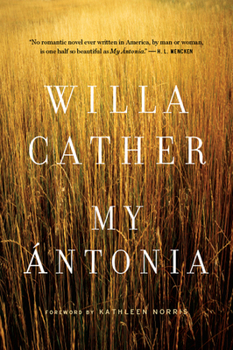My Antonia
(Part of the Great Plains Trilogy (#3) Series and Great Plains Trilogy (#3) Series)
Select Format
Select Condition 
Book Overview
One of the most significant American novels of the twentieth century, Willa Cather's heartfelt novel is the unforgettable story of an immigrant woman's life on the hardscrabble Nebraska plains.
Through Jim Burden's affectionate reminiscence of his childhood friend, the free-spirited ?ntonia Shimerda, a larger, uniquely American portrait emerges, both of a community struggling with unforgiving terrain and of a woman who, amid...
Customer Reviews
"She was a rich mine of life, like the founders of early races."
immigrants
The Woman Who Won The West
A TRUE AMERICAN CLASSIC...
Some memories are realities
My Ántonia Mentions in Our Blog

As long as there have been books, there have been women writers, but until the last few centuries, their voices were marginalized, discounted, and even silenced. Finally, this is changing. In celebration of Women's History Month, here are 21 time-honored classics by women who broke new ground and earned their spot in literary history.

It's hard to beat the excitement of falling in love—especially first love. It's intoxicating and all-consuming—that sense of full-throated euphoria that makes you want to shout from the rooftops. As we look ahead toward Valentine's Day, we're highlighting fifteen heartfelt novels about first love.





